Academic Grading System Logic
VerifiedAdded on 2020/05/28
|9
|1073
|74
AI Summary
This assignment delves into designing a digital logic circuit for an academic grading system. The system requires three or more passing assessments (Assignment, Blog, Discussion Forum, Quiz) out of four to achieve a passing grade overall. Students must meet specific criteria in each assessment category and understand the Boolean logic expressions and truth tables that govern the grading outcome.
Contribute Materials
Your contribution can guide someone’s learning journey. Share your
documents today.
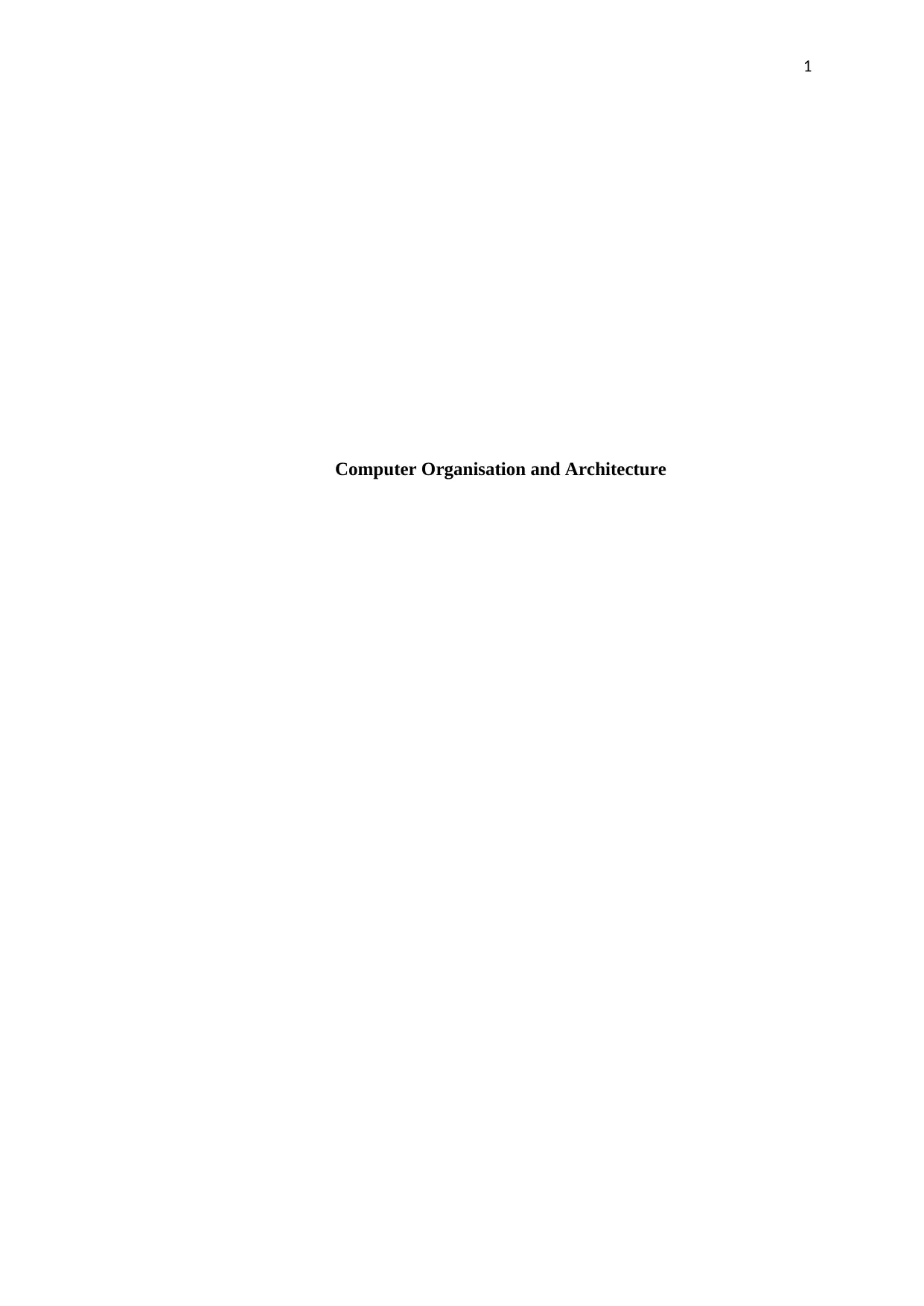
1
Computer Organisation and Architecture
Computer Organisation and Architecture
Secure Best Marks with AI Grader
Need help grading? Try our AI Grader for instant feedback on your assignments.
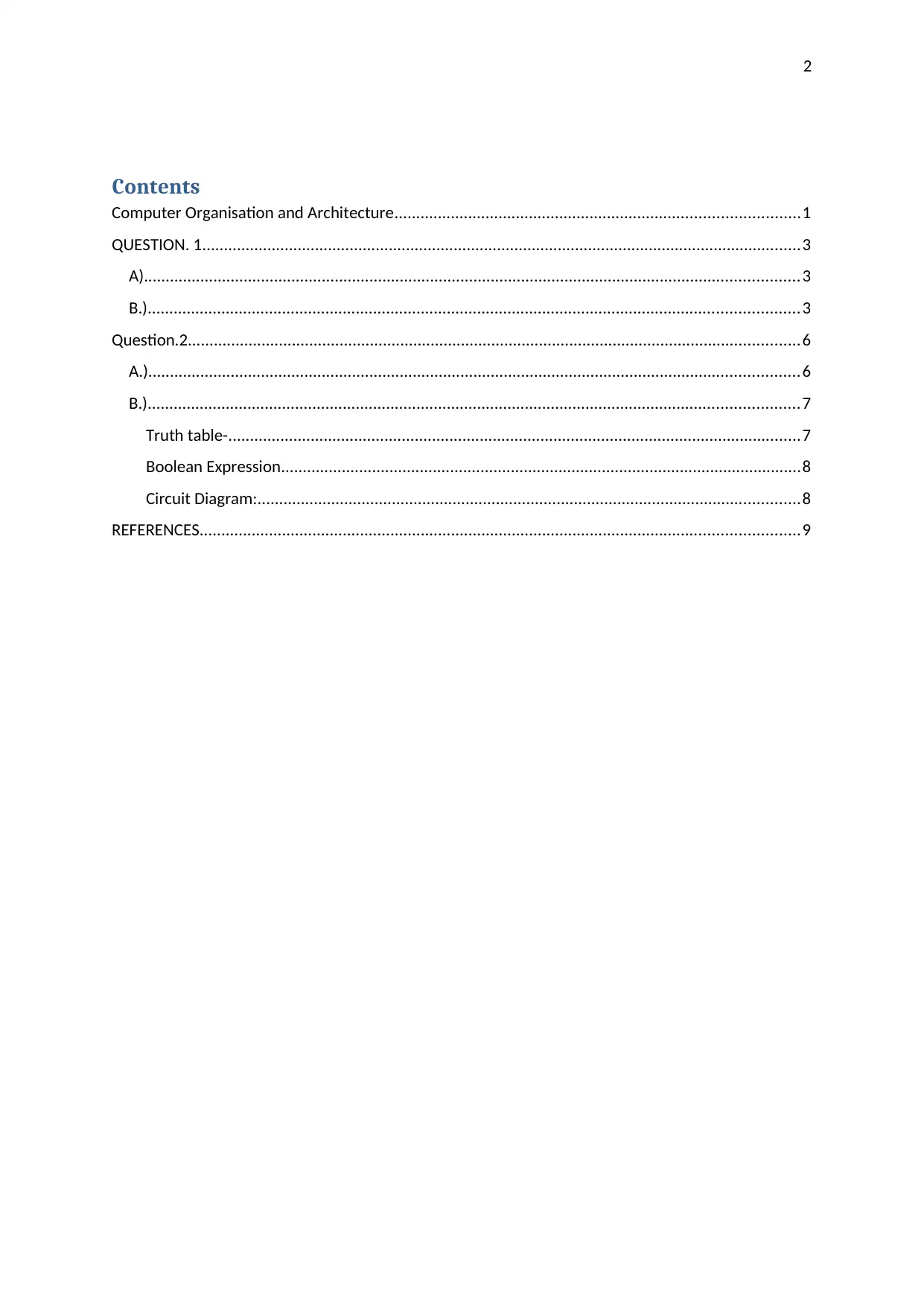
2
Contents
Computer Organisation and Architecture.............................................................................................1
QUESTION. 1..........................................................................................................................................3
A).......................................................................................................................................................3
B.)......................................................................................................................................................3
Question.2.............................................................................................................................................6
A.)......................................................................................................................................................6
B.)......................................................................................................................................................7
Truth table-....................................................................................................................................7
Boolean Expression........................................................................................................................8
Circuit Diagram:.............................................................................................................................8
REFERENCES..........................................................................................................................................9
Contents
Computer Organisation and Architecture.............................................................................................1
QUESTION. 1..........................................................................................................................................3
A).......................................................................................................................................................3
B.)......................................................................................................................................................3
Question.2.............................................................................................................................................6
A.)......................................................................................................................................................6
B.)......................................................................................................................................................7
Truth table-....................................................................................................................................7
Boolean Expression........................................................................................................................8
Circuit Diagram:.............................................................................................................................8
REFERENCES..........................................................................................................................................9
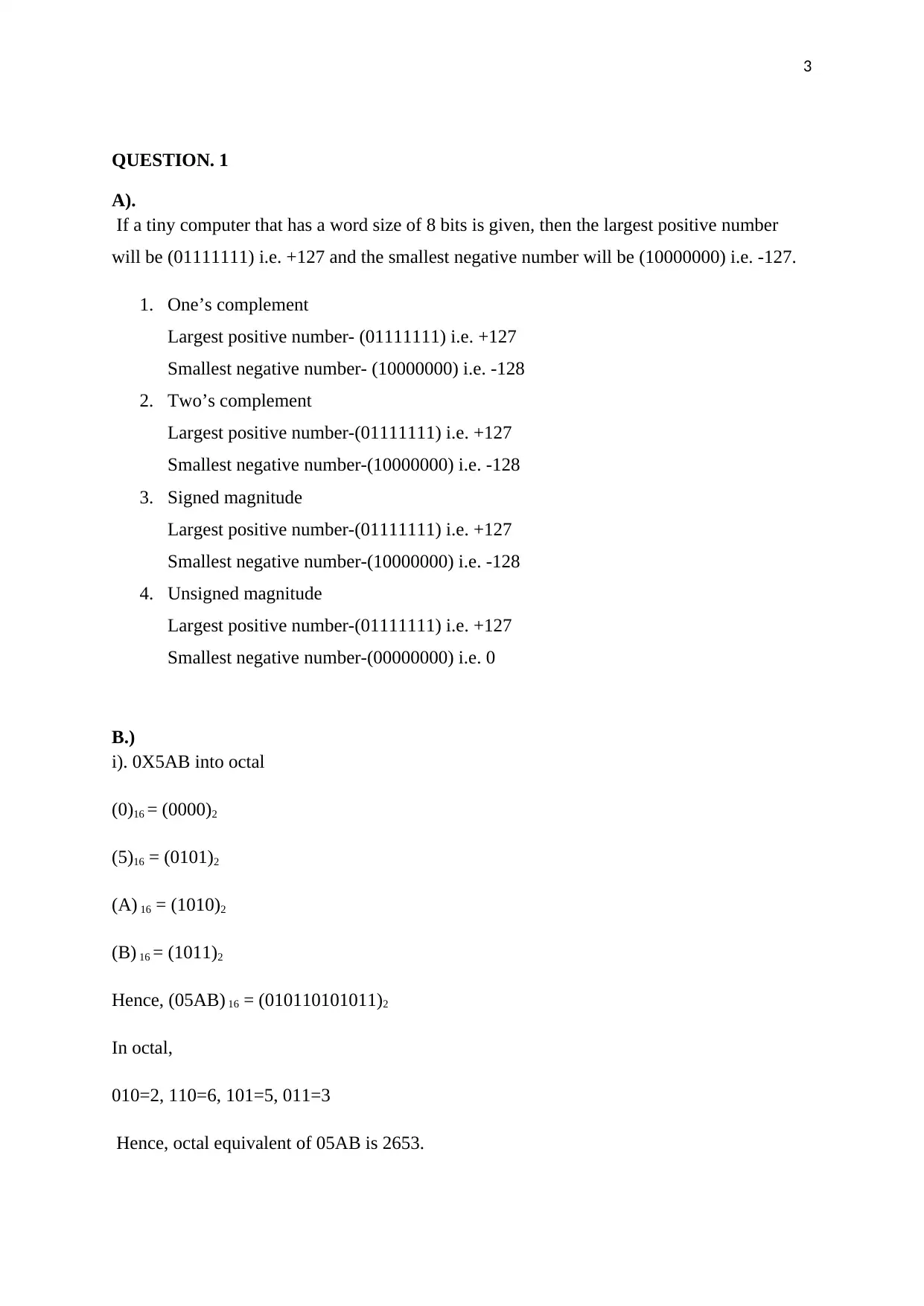
3
QUESTION. 1
A).
If a tiny computer that has a word size of 8 bits is given, then the largest positive number
will be (01111111) i.e. +127 and the smallest negative number will be (10000000) i.e. -127.
1. One’s complement
Largest positive number- (01111111) i.e. +127
Smallest negative number- (10000000) i.e. -128
2. Two’s complement
Largest positive number-(01111111) i.e. +127
Smallest negative number-(10000000) i.e. -128
3. Signed magnitude
Largest positive number-(01111111) i.e. +127
Smallest negative number-(10000000) i.e. -128
4. Unsigned magnitude
Largest positive number-(01111111) i.e. +127
Smallest negative number-(00000000) i.e. 0
B.)
i). 0X5AB into octal
(0)16 = (0000)2
(5)16 = (0101)2
(A) 16 = (1010)2
(B) 16 = (1011)2
Hence, (05AB) 16 = (010110101011)2
In octal,
010=2, 110=6, 101=5, 011=3
Hence, octal equivalent of 05AB is 2653.
QUESTION. 1
A).
If a tiny computer that has a word size of 8 bits is given, then the largest positive number
will be (01111111) i.e. +127 and the smallest negative number will be (10000000) i.e. -127.
1. One’s complement
Largest positive number- (01111111) i.e. +127
Smallest negative number- (10000000) i.e. -128
2. Two’s complement
Largest positive number-(01111111) i.e. +127
Smallest negative number-(10000000) i.e. -128
3. Signed magnitude
Largest positive number-(01111111) i.e. +127
Smallest negative number-(10000000) i.e. -128
4. Unsigned magnitude
Largest positive number-(01111111) i.e. +127
Smallest negative number-(00000000) i.e. 0
B.)
i). 0X5AB into octal
(0)16 = (0000)2
(5)16 = (0101)2
(A) 16 = (1010)2
(B) 16 = (1011)2
Hence, (05AB) 16 = (010110101011)2
In octal,
010=2, 110=6, 101=5, 011=3
Hence, octal equivalent of 05AB is 2653.
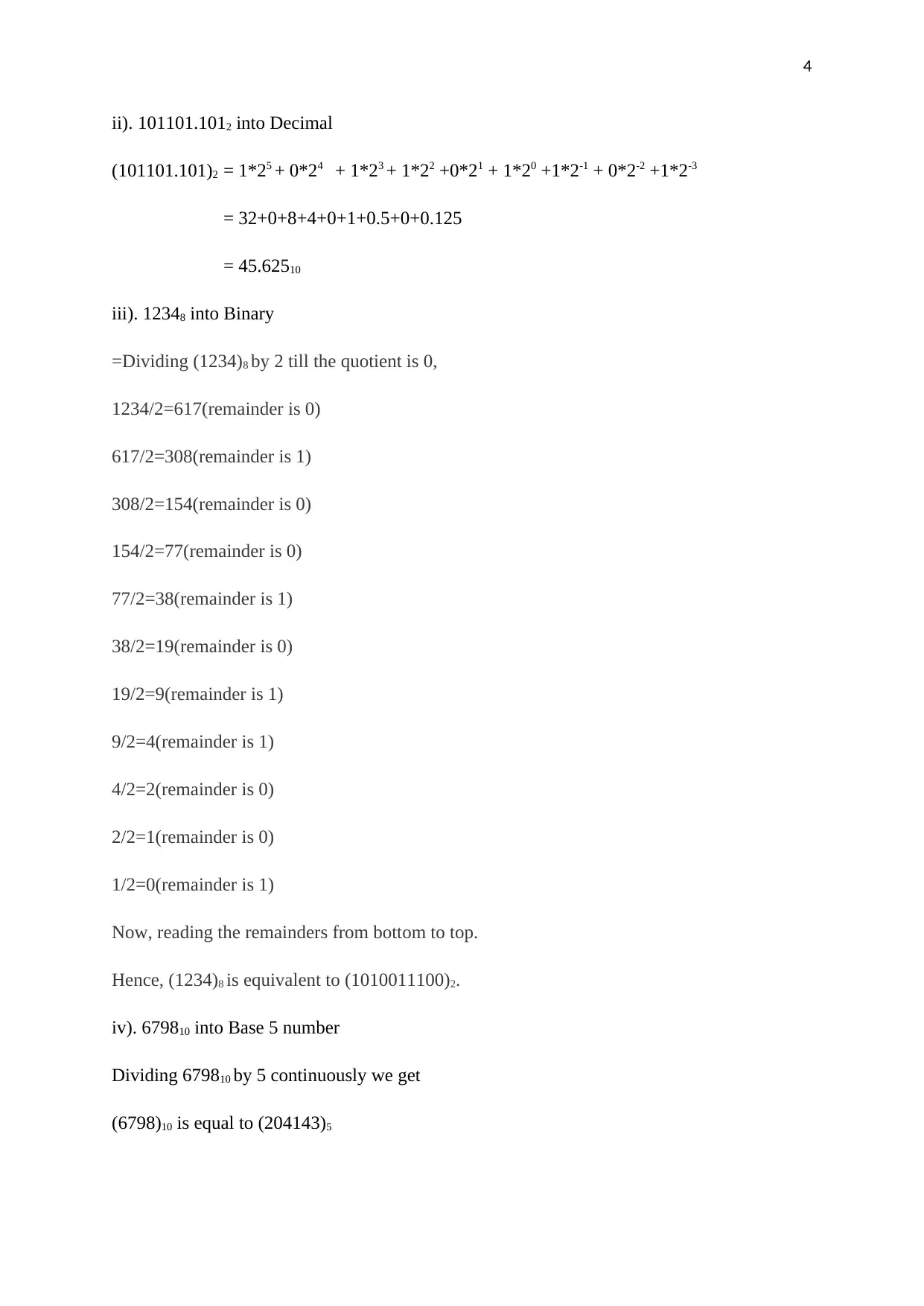
4
ii). 101101.1012 into Decimal
(101101.101)2 = 1*25 + 0*24 + 1*23 + 1*22 +0*21 + 1*20 +1*2-1 + 0*2-2 +1*2-3
= 32+0+8+4+0+1+0.5+0+0.125
= 45.62510
iii). 12348 into Binary
=Dividing (1234)8 by 2 till the quotient is 0,
1234/2=617(remainder is 0)
617/2=308(remainder is 1)
308/2=154(remainder is 0)
154/2=77(remainder is 0)
77/2=38(remainder is 1)
38/2=19(remainder is 0)
19/2=9(remainder is 1)
9/2=4(remainder is 1)
4/2=2(remainder is 0)
2/2=1(remainder is 0)
1/2=0(remainder is 1)
Now, reading the remainders from bottom to top.
Hence, (1234)8 is equivalent to (1010011100)2.
iv). 679810 into Base 5 number
Dividing 679810 by 5 continuously we get
(6798)10 is equal to (204143)5
ii). 101101.1012 into Decimal
(101101.101)2 = 1*25 + 0*24 + 1*23 + 1*22 +0*21 + 1*20 +1*2-1 + 0*2-2 +1*2-3
= 32+0+8+4+0+1+0.5+0+0.125
= 45.62510
iii). 12348 into Binary
=Dividing (1234)8 by 2 till the quotient is 0,
1234/2=617(remainder is 0)
617/2=308(remainder is 1)
308/2=154(remainder is 0)
154/2=77(remainder is 0)
77/2=38(remainder is 1)
38/2=19(remainder is 0)
19/2=9(remainder is 1)
9/2=4(remainder is 1)
4/2=2(remainder is 0)
2/2=1(remainder is 0)
1/2=0(remainder is 1)
Now, reading the remainders from bottom to top.
Hence, (1234)8 is equivalent to (1010011100)2.
iv). 679810 into Base 5 number
Dividing 679810 by 5 continuously we get
(6798)10 is equal to (204143)5
Secure Best Marks with AI Grader
Need help grading? Try our AI Grader for instant feedback on your assignments.
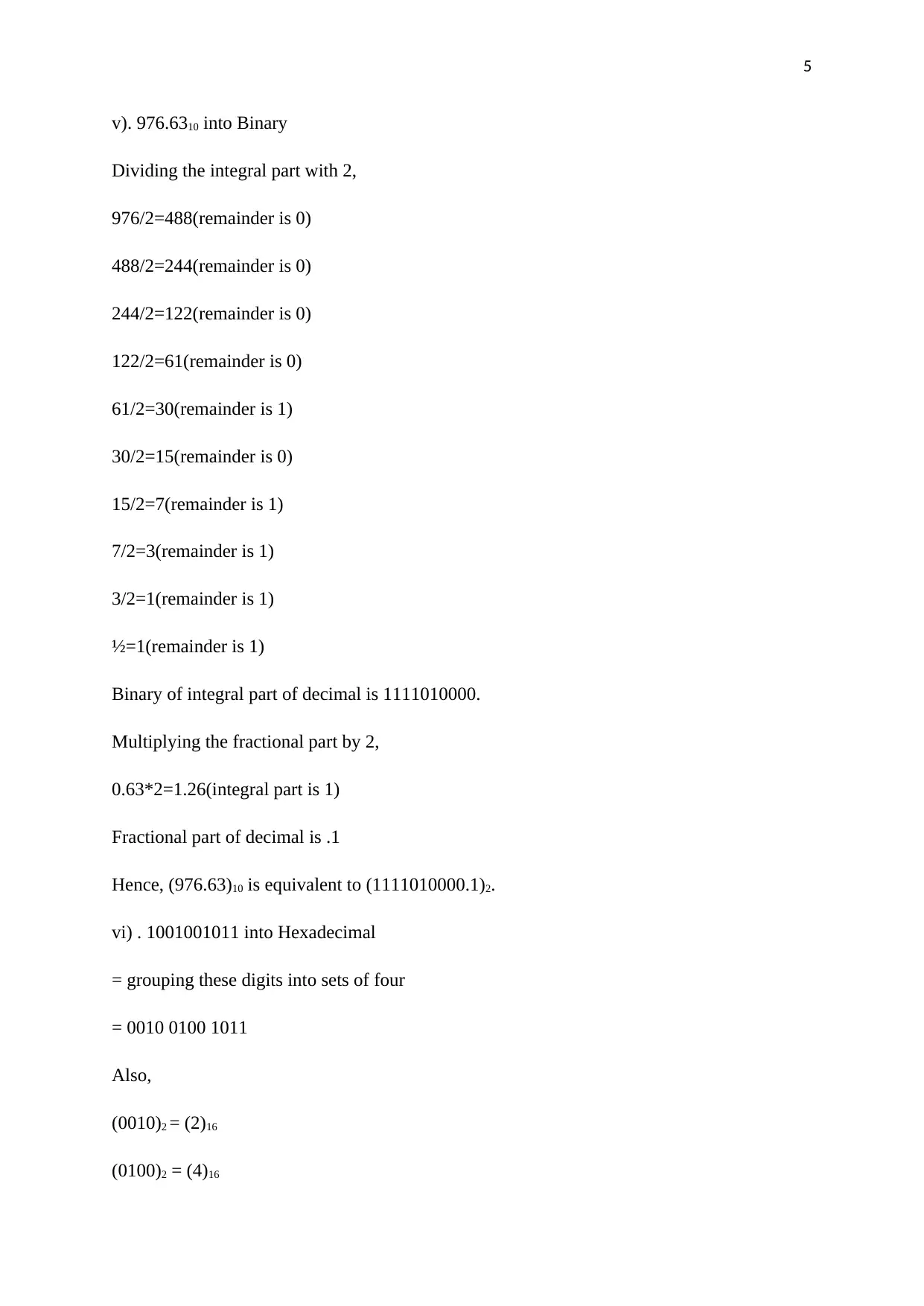
5
v). 976.6310 into Binary
Dividing the integral part with 2,
976/2=488(remainder is 0)
488/2=244(remainder is 0)
244/2=122(remainder is 0)
122/2=61(remainder is 0)
61/2=30(remainder is 1)
30/2=15(remainder is 0)
15/2=7(remainder is 1)
7/2=3(remainder is 1)
3/2=1(remainder is 1)
½=1(remainder is 1)
Binary of integral part of decimal is 1111010000.
Multiplying the fractional part by 2,
0.63*2=1.26(integral part is 1)
Fractional part of decimal is .1
Hence, (976.63)10 is equivalent to (1111010000.1)2.
vi) . 1001001011 into Hexadecimal
= grouping these digits into sets of four
= 0010 0100 1011
Also,
(0010)2 = (2)16
(0100)2 = (4)16
v). 976.6310 into Binary
Dividing the integral part with 2,
976/2=488(remainder is 0)
488/2=244(remainder is 0)
244/2=122(remainder is 0)
122/2=61(remainder is 0)
61/2=30(remainder is 1)
30/2=15(remainder is 0)
15/2=7(remainder is 1)
7/2=3(remainder is 1)
3/2=1(remainder is 1)
½=1(remainder is 1)
Binary of integral part of decimal is 1111010000.
Multiplying the fractional part by 2,
0.63*2=1.26(integral part is 1)
Fractional part of decimal is .1
Hence, (976.63)10 is equivalent to (1111010000.1)2.
vi) . 1001001011 into Hexadecimal
= grouping these digits into sets of four
= 0010 0100 1011
Also,
(0010)2 = (2)16
(0100)2 = (4)16
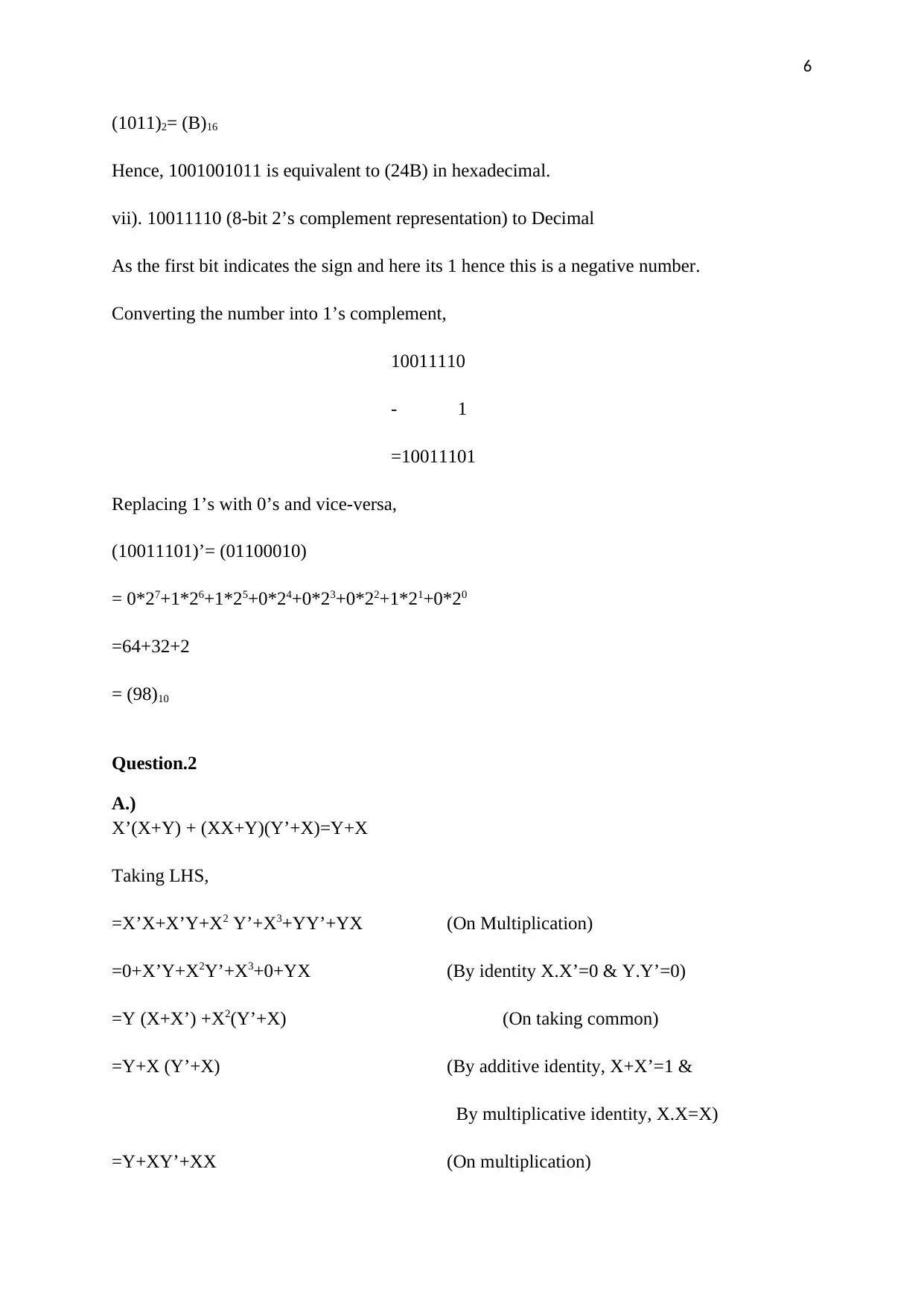
6
(1011)2= (B)16
Hence, 1001001011 is equivalent to (24B) in hexadecimal.
vii). 10011110 (8-bit 2’s complement representation) to Decimal
As the first bit indicates the sign and here its 1 hence this is a negative number.
Converting the number into 1’s complement,
10011110
- 1
=10011101
Replacing 1’s with 0’s and vice-versa,
(10011101)’= (01100010)
= 0*27+1*26+1*25+0*24+0*23+0*22+1*21+0*20
=64+32+2
= (98)10
Question.2
A.)
X’(X+Y) + (XX+Y)(Y’+X)=Y+X
Taking LHS,
=X’X+X’Y+X2 Y’+X3+YY’+YX (On Multiplication)
=0+X’Y+X2Y’+X3+0+YX (By identity X.X’=0 & Y.Y’=0)
=Y (X+X’) +X2(Y’+X) (On taking common)
=Y+X (Y’+X) (By additive identity, X+X’=1 &
By multiplicative identity, X.X=X)
=Y+XY’+XX (On multiplication)
(1011)2= (B)16
Hence, 1001001011 is equivalent to (24B) in hexadecimal.
vii). 10011110 (8-bit 2’s complement representation) to Decimal
As the first bit indicates the sign and here its 1 hence this is a negative number.
Converting the number into 1’s complement,
10011110
- 1
=10011101
Replacing 1’s with 0’s and vice-versa,
(10011101)’= (01100010)
= 0*27+1*26+1*25+0*24+0*23+0*22+1*21+0*20
=64+32+2
= (98)10
Question.2
A.)
X’(X+Y) + (XX+Y)(Y’+X)=Y+X
Taking LHS,
=X’X+X’Y+X2 Y’+X3+YY’+YX (On Multiplication)
=0+X’Y+X2Y’+X3+0+YX (By identity X.X’=0 & Y.Y’=0)
=Y (X+X’) +X2(Y’+X) (On taking common)
=Y+X (Y’+X) (By additive identity, X+X’=1 &
By multiplicative identity, X.X=X)
=Y+XY’+XX (On multiplication)
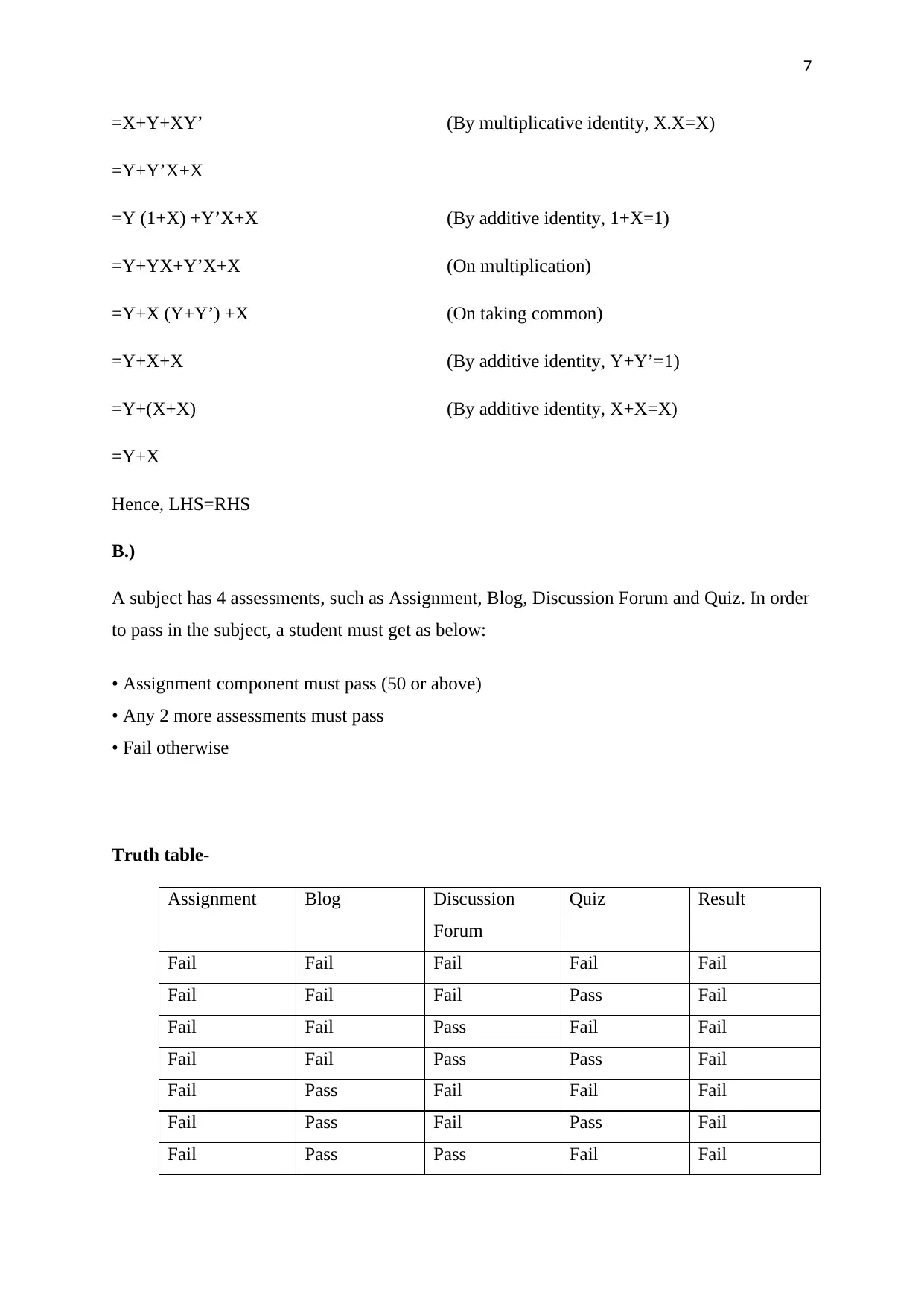
7
=X+Y+XY’ (By multiplicative identity, X.X=X)
=Y+Y’X+X
=Y (1+X) +Y’X+X (By additive identity, 1+X=1)
=Y+YX+Y’X+X (On multiplication)
=Y+X (Y+Y’) +X (On taking common)
=Y+X+X (By additive identity, Y+Y’=1)
=Y+(X+X) (By additive identity, X+X=X)
=Y+X
Hence, LHS=RHS
B.)
A subject has 4 assessments, such as Assignment, Blog, Discussion Forum and Quiz. In order
to pass in the subject, a student must get as below:
• Assignment component must pass (50 or above)
• Any 2 more assessments must pass
• Fail otherwise
Truth table-
Assignment Blog Discussion
Forum
Quiz Result
Fail Fail Fail Fail Fail
Fail Fail Fail Pass Fail
Fail Fail Pass Fail Fail
Fail Fail Pass Pass Fail
Fail Pass Fail Fail Fail
Fail Pass Fail Pass Fail
Fail Pass Pass Fail Fail
=X+Y+XY’ (By multiplicative identity, X.X=X)
=Y+Y’X+X
=Y (1+X) +Y’X+X (By additive identity, 1+X=1)
=Y+YX+Y’X+X (On multiplication)
=Y+X (Y+Y’) +X (On taking common)
=Y+X+X (By additive identity, Y+Y’=1)
=Y+(X+X) (By additive identity, X+X=X)
=Y+X
Hence, LHS=RHS
B.)
A subject has 4 assessments, such as Assignment, Blog, Discussion Forum and Quiz. In order
to pass in the subject, a student must get as below:
• Assignment component must pass (50 or above)
• Any 2 more assessments must pass
• Fail otherwise
Truth table-
Assignment Blog Discussion
Forum
Quiz Result
Fail Fail Fail Fail Fail
Fail Fail Fail Pass Fail
Fail Fail Pass Fail Fail
Fail Fail Pass Pass Fail
Fail Pass Fail Fail Fail
Fail Pass Fail Pass Fail
Fail Pass Pass Fail Fail
Paraphrase This Document
Need a fresh take? Get an instant paraphrase of this document with our AI Paraphraser
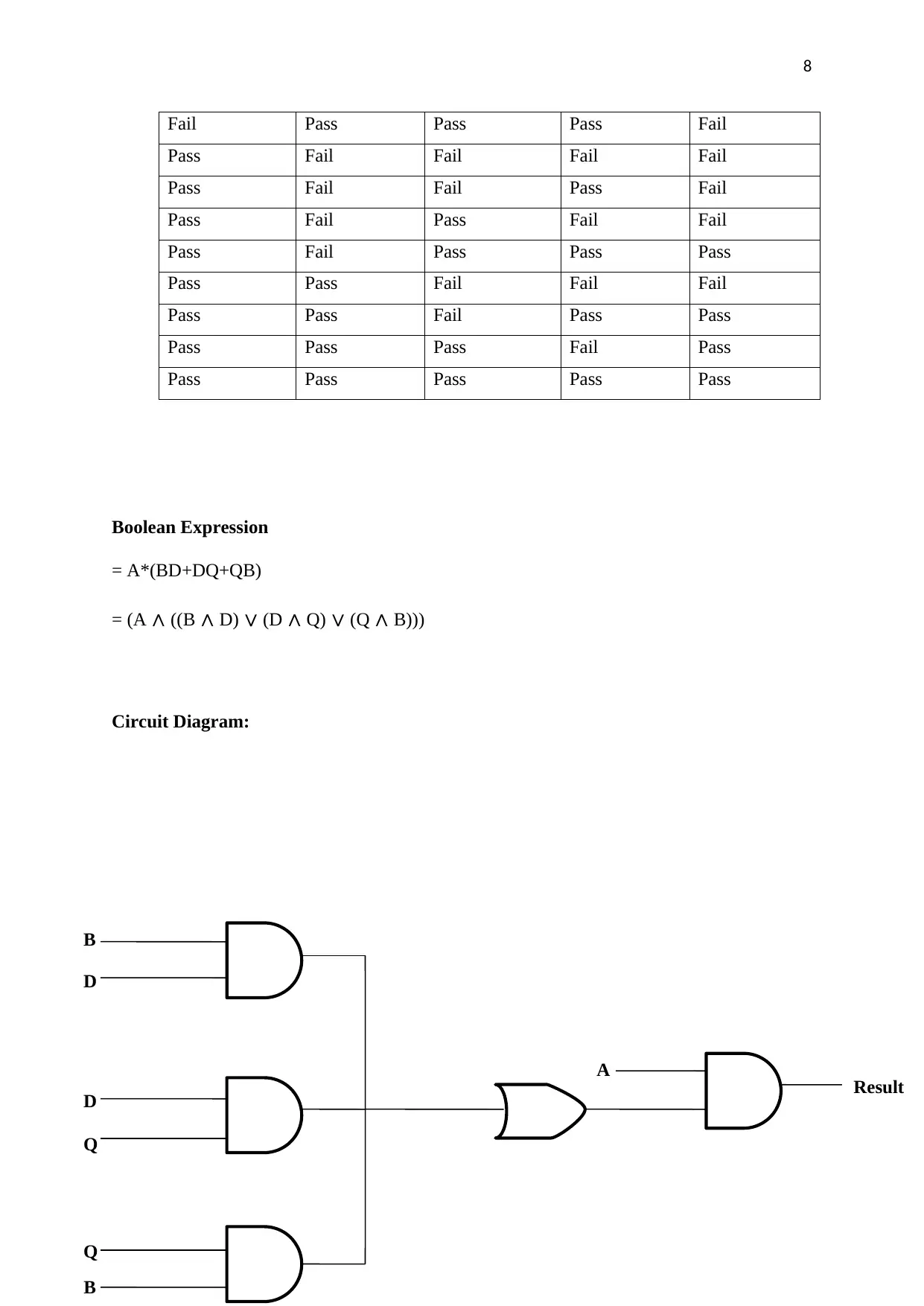
8
Fail Pass Pass Pass Fail
Pass Fail Fail Fail Fail
Pass Fail Fail Pass Fail
Pass Fail Pass Fail Fail
Pass Fail Pass Pass Pass
Pass Pass Fail Fail Fail
Pass Pass Fail Pass Pass
Pass Pass Pass Fail Pass
Pass Pass Pass Pass Pass
Boolean Expression
= A*(BD+DQ+QB)
= (A ∧ ((B ∧ D) ∨ (D ∧ Q) ∨ (Q ∧ B)))
Circuit Diagram:
AND
AND
AND
AND
B
D
D
Q
Q
B
A Result
Fail Pass Pass Pass Fail
Pass Fail Fail Fail Fail
Pass Fail Fail Pass Fail
Pass Fail Pass Fail Fail
Pass Fail Pass Pass Pass
Pass Pass Fail Fail Fail
Pass Pass Fail Pass Pass
Pass Pass Pass Fail Pass
Pass Pass Pass Pass Pass
Boolean Expression
= A*(BD+DQ+QB)
= (A ∧ ((B ∧ D) ∨ (D ∧ Q) ∨ (Q ∧ B)))
Circuit Diagram:
AND
AND
AND
AND
B
D
D
Q
Q
B
A Result
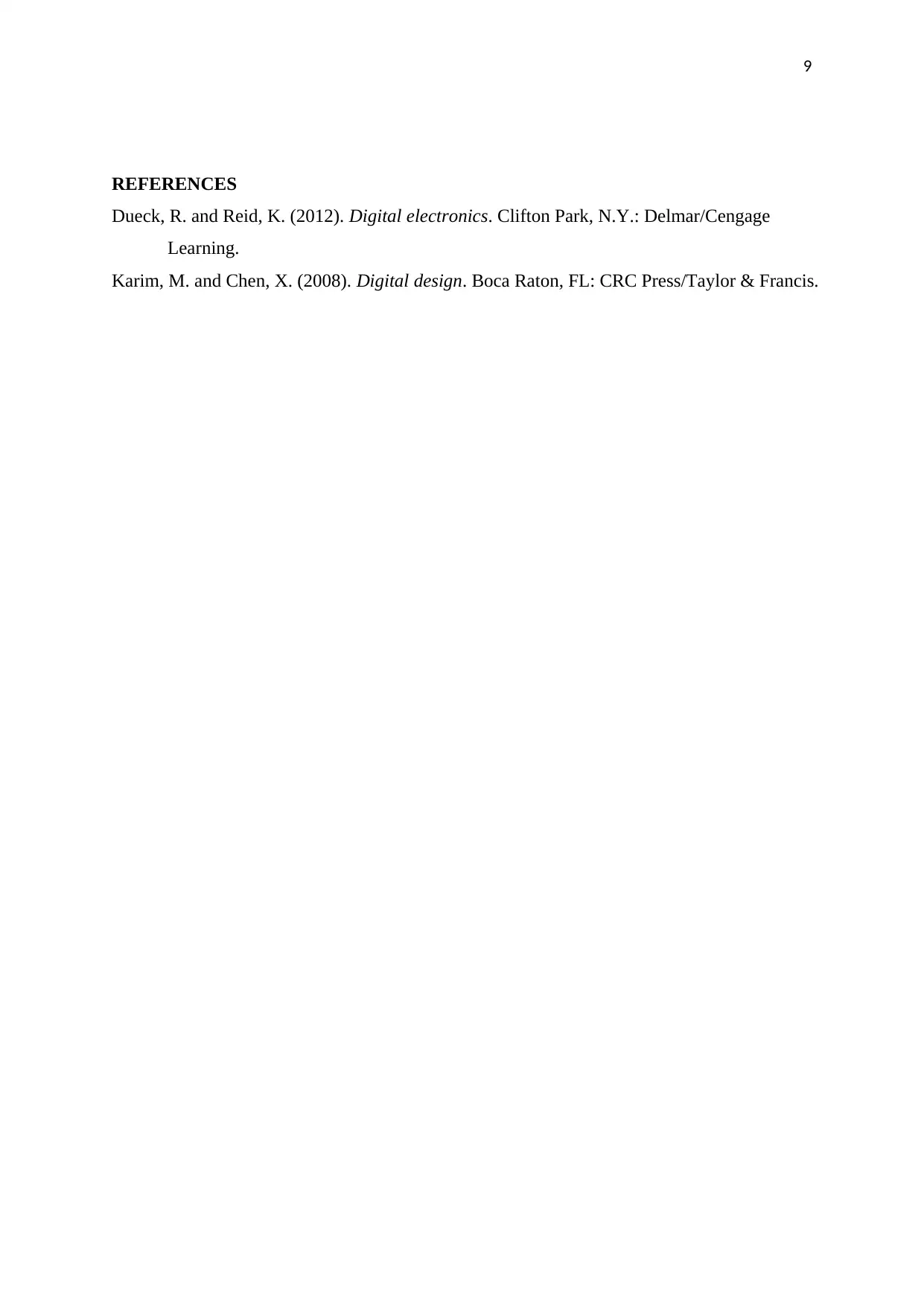
9
REFERENCES
Dueck, R. and Reid, K. (2012). Digital electronics. Clifton Park, N.Y.: Delmar/Cengage
Learning.
Karim, M. and Chen, X. (2008). Digital design. Boca Raton, FL: CRC Press/Taylor & Francis.
REFERENCES
Dueck, R. and Reid, K. (2012). Digital electronics. Clifton Park, N.Y.: Delmar/Cengage
Learning.
Karim, M. and Chen, X. (2008). Digital design. Boca Raton, FL: CRC Press/Taylor & Francis.
1 out of 9
Related Documents
Your All-in-One AI-Powered Toolkit for Academic Success.
+13062052269
info@desklib.com
Available 24*7 on WhatsApp / Email
![[object Object]](/_next/static/media/star-bottom.7253800d.svg)
Unlock your academic potential
© 2024 | Zucol Services PVT LTD | All rights reserved.





